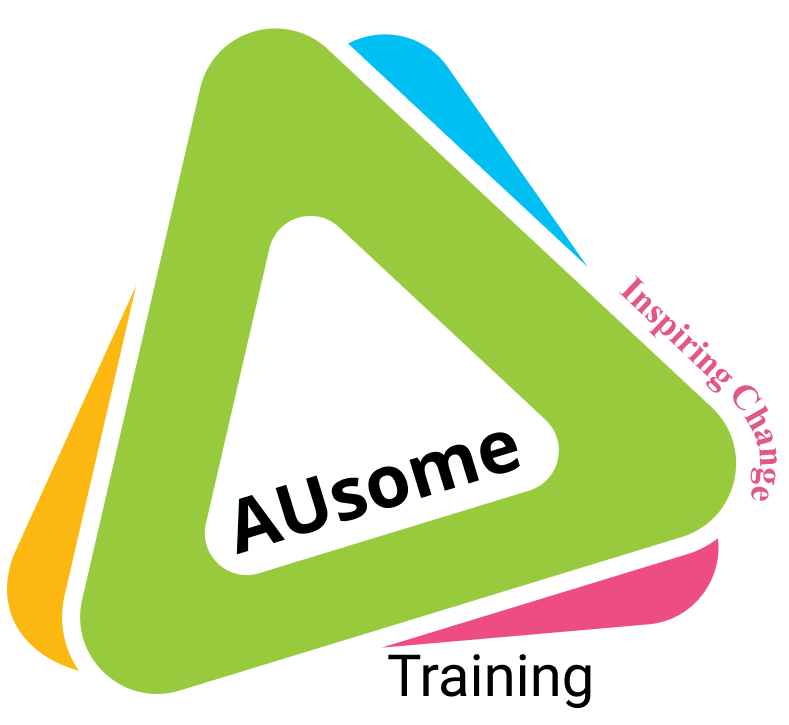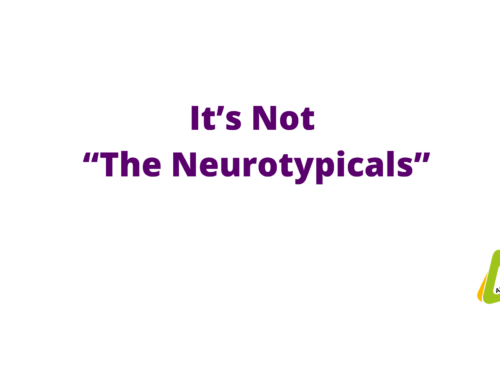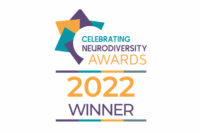How do I know I’m Autistic? Let me count the ways…
A great question! Maybe you’re reading this as an adult who has lots of unanswered questions about your life so far or maybe you’re a parent who is concerned about your child but things you’re reading aren’t ringing true for you. Either way I’m going to offer you some ideas outside of the very negative and inaccurate medical model.
Maybe you’ve read that Autistic people have poor social skills or difficulties in social communication and you think well no, I’m pretty outgoing or my child has friends so they can’t be Autistic so let’s start there…
Autistic people aren’t deficient in social skills at all actually. The reality is that we have a slightly different way of communicating than non-autistic people do. So how do I know if I’m Autistic then? Here are a few examples of how social difficulties arise for us due to other people misinterpreting us and us finding their ways of interacting confusing or off-putting.
Have you ever said something in a group only to have no one respond and then a few minutes later witness someone else in that group say virtually the same thing as you and then everyone responds like it’s the best thing they’ve ever heard? If this has happened to you often enough that you are nodding along to this scenario then that’s a good example of what happens to us in group situations. It can often be because we said it in a different tone to the other person or because that person has a higher social status within the group except we are unaware of this social status and the social hierarchy that many groups function within. We are often dismissed, ignored or overlooked because we may come across as unassertive or unimportant even though our points are really interesting and valid. This doesn’t happen so much in Autistic spaces where we understand each other better and aren’t operating in a social hierarchy.
Have you ever been totally confused by someone’s turn of phrase or maybe they were joking but you took them seriously. I mean, let’s not get carried away- this happens to human beings because we don’t all communicate the same way nor do we share a uniform sense of humour. But if it has happened to you a lot then it could well be that you communicate Autistically and mean what you say. Therefore you take other people at face value and assume they also mean what they say. This can mean we believe people when they say they’ll call us, we may not pick up when people are exaggerating or that we can get odd responses when we respond to figurative or throw away comments in a factual way.
Maybe you’ve been told you take things too literally? Well Autistics take things literally! Words matter to us. Do you pay attention to what people say- remember their words verbatim at times? Do people often tell you that you’ve taken them up wrong and say things like “that’s not what I meant/ said?” Have you left conversations exhausted and confused?
Do you re-run conversations and interactions after the other person has left, maybe for days or weeks after trying to figure out what it was all about?
Do you berate yourself for “saying the wrong thing”?
Do you often leave social situations embarrassed and face social situations with dread and fear?
Do you have an internal critic constantly telling you that you did or said something wrong?
Do you find yourself blaming yourself for broken relationships, lost friendships or for having no friends at work?
Have you been accused of being cheeky or annoying when you were just asking a question you needed to ask?
Have you often been accused of not listening because you were looking away from the person or not making eye contact even though you were listening attentively?
Have you left situations really confused? Maybe you called to see some people you know and left with a feeing that you’d outstayed your welcome but you’re not sure why. Chances are your gut picked up but your mind overrode it because they said things like “ ah no, stay a while” or “you don’t have to go” and you took them literally. Or maybe you didn’t read into their double messages when they started asking you what you were up to for the rest of the day. These are examples of social codes that sometimes Autistic people miss because we don’t use them in our way of communicating.
Autistics are sensitive so we can take things to heart. We can get hurt easily and we can take other people’s comments and actions really personally. Maybe a colleague at work is giving out about the place you work in and you’re concerned for them because they’re unhappy and you offer advice or start looking up new jobs for them but really they were just venting and have no intention of leaving the place you work at. We can take on other people’s problems and sometimes even their emotions and it can be a tough task to work out what we’re feeling at times.
Maybe you avoid conflict and freeze at the thought of confronting someone with something you are not happy with. Perhaps you always put the needs of others ahead of your own even though you are hurting. It’s common for us to develop people pleasing habits early on in life so maybe you feel sorry for the person who has offended you or you don’t want to upset them or make them feel bad by telling them they did something that made you feel bad.
You might say yes to things and then wish you hadn’t and spend tons of time agonising over doing the thing you agreed to do but didn’t really want to. You may have great difficulty saying no to people which can often lead to you being overextended and too exhausted to do the things you actually want to do.
Do you try to respond with the “right” answer rather than what you feel and think? Even to simple questions like “what music do you like”?
Most Autistics mask as a way to protect ourselves from ridicule and rejection. This means that we might re-run past interactions and work out best ways to respond to people based on our learnings from past “mistakes”. Masking means that you may be putting up with things that make you feel uncomfortable whether that’s other people’s demands or sensory inputs.
Being Autistic means that we are sensitive. If you take away all the by-products of living in a world that treats us pretty shabbily then that’s what you’re left with; really sensitive people. Autistic people are sensitive to things that we experience through our senses which is everything! We can be sensitive to different colours, different types of sound or quality of sounds. We can notice things that other don’t and take great joy from sensory experiences like rubbing a cat, clicking a pen, rubbing a coin in our hand, pacing up and down, watching the flames of the fire dance before us… and so much more.
Maybe you’ve looked up “sensory” and came across all the negative stories of Autistics being overloaded by our sensory environment but think- well I can’t be Autistic because I don’t have meltdowns. Autistic people can exist without having meltdowns. In fact we could be existing without meltdowns. Maybe you’re an adult who has built a world and environment that suits your needs. I have dimmer switches in every room in my home, I did this long before I knew I was Autistic and that’s just one example of how I was managing my sensory input without really being aware that I was.
But “sensory” experiences can also be joyful so maybe you get great joy from looking at art or from running or lifting weights. Maybe you love the feel of certain materials. Maybe all of your bedsheets are cotton. Maybe when you go shopping for clothes or household items you make your decisions not just on what they look like but on how they feel to your touch.
Maybe as a kid tags on clothes annoyed you or the feel of velvet sent you screaming down the hallway at home. Perhaps you sat for hours watching the rain run down the window, observing the thread of raindrops, their patterns and flow.
Do you have interests that some people have told you are “weird” or “too intense” or “fanatical” ? It’s common for us Autistics to be very passionate about our interests. We’re an intense bunch. So just like humans in general we have interests, topics or hobbies that interest us but we are just so into ours that other people find it strange- other people but not in Autistic spaces. Maybe you have a really cool collection of teeth that you lost as a kid, or stones you found in various places, or you collect spoons, buttons, ware or figurines. Maybe you collect information and love to read everything available on your favourite topic. Or perhaps when you take on a new hobby you go out and buy all the gear- like the baking enthusiastic who invests in 50 baking books, watches every Bake- off on tv and spends most of their spare time thinking about that lovely special interest. Maybe you’re really into cars or machinery and know the models of every car, truck or tractor ever built. Sometimes people who just don’t get us and who are not very accepting or open-minded in their views can tell us our hobbies or interests are weird or obscure or not age appropriate. Have you ever loved something but hid it from others for fear of ridicule? Do you find yourself obsessed with something and then leave it and move onto some other thing that really excites you?
You are highly empathetic to the needs of others- and not just in a people pleasing way. You care deeply about the suffering of others or animal welfare. Are you concerned about the state of the world right now and feel that sometimes others aren’t taking it very seriously? You often express your empathy but maybe find yourself being accused of not caring or making a situation all about you when you’re not. We express empathy by saying things like “that’s like the time when I…” after listening to someone share. By doing this we’re searching for an exact time when we felt like the other person might feel right now. However others might interpret this as turning the conversation around to ourselves instead of giving them the comfort they were looking for.
Am I Autistic?
Below is a summary list of common Autistic traits:
- Deep thinker- often bored by frivolous exchanges
- Sees no point in chit chat and loves deep conversations
- Connects on a deep level with likeminded people
- Takes great joy from learning/ collecting/ interests
- Often notices things others don’t- attention to detail
- Appears to be inattentive but is actively listening when looking away
- Always wanting to help
- Self teacher, autodidactic learner.
- Strong sense of justice, often overwhelmed when things are “unfair”. As a kid you may have made sure all your toys got their turn so they wouldn’t feel left out/ feel ignored.
- Highly empathetic – to others and/ or animals/ other living things
- Often go off on “tangents” on a topic that comes to mind during a conversation. You may feel that you have to excuse/ explain the tangent to non-autistic people
- Passionate about issues/ causes
- A logical thinker who may get annoyed with illogical story lines, illogical rules. You need to see a point to everything
- Creative, in thinking and/ or expression
- An honest, direct communicator
- Sensitive- may be overwhelmed by overstimulating environments, situations.
- Words matter to you
- You recognise patterns and relationships between things/ people/ events
- You have an ability to hyper focus
- When you are hyper focused or engrossed you get into a flow state and if interrupted can have a big response and take ages to return to flow state.
- You are motivated by reasoning and logic – you ask why a lot!
- You are motivated by helping others and your intense empathy- seeing others in pain is often like experiencing it yourself
- You might find somethings extremely tedious, have difficulty switching tasks or motivating yourself to do things you have no interest in.
Common situations Autistic people experience
Being told you are cheeky/ rude/ blunt
Being accused of not listening
Excluded by peers as a child or adult
Feeling confused in social situations, like no one gave you the handbook
Being told you are reading into things
Being told you are too sensitive
Being accused of taking over the conversation
Being told you are over-reacting
Being told you are too dramatic
Being told you don’t care about others
You are confused by group dynamics, power play and games people play
Your honesty was used against you in friendships/ relationships
You may have been in abusive relationships
You’ve been told you don’t respect authority
You’ve been told you are just being awkward
You’ve been told “it’s not too loud, bright, busy etc”
You’ve been told things you say/ do are inappropriate
Being told that you are just trying to be different.
Anxiety/ Trauma responses often experienced by Autistics:
Fear of or difficulty making phone calls
People pleasing -over extending yourself for others
Taking on too much
Not saying no
Hiding your interests
Hiding your intelligence
Hiding your discomfort
Putting other people’s needs and comfort before your own
Perfectionism
Having to complete things and putting yourself under pressure to do so
Not asking others for help
Bottling up feelings inside
Being defensive
Being very sensitive to criticism and rejection
Take feedback as criticism even if it’s not intended
Will focus on the one negative thing rather than all the positives
Difficulties with executive function like motivating yourself, breaking down big tasks into smaller parts, planning, being overwhelmed
You might call yourself a procrastinator
If these have been common experiences and you found yourself agreeing with what was written here then it might be worth exploring your Autistic identity more. We have a whole range of courses where you can learn more and learn it from people who are Autistic themselves. If you’d like to explore a formal diagnosis then we recommend RTN but lots of people choose to self identify instead of going down the medical route. It’s entirely a personal decision.




